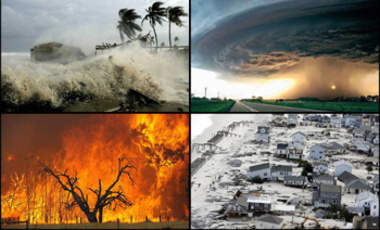Storm Surge

Like most Americans, I watched with sympathy and shock as Hurricane Harvey slammed into the coast of Texas and dropped more than 50 inches of rain on Houston, a sprawling city utterly incapable of draining such prodigious amounts of water. The floodwaters rose, swallowing homes and cars and irreplaceable possessions without mercy. Terrified families were trapped in attics or on rooftops, rescued by first responders and the Cajan Navy and countless other brave, selfless volunteers. In the face of disaster, America once again showed its best, coming as close as it ever can to embodying its ideals. Hope refuses to drown. As the waters recede, we comfort ourselves with experts' assurances that we've just experienced a "thousand-year storm."
But -- honestly -- if we experience one of these "unprecedented" weather events every other year, isn't it time to ask ourselves why history seems to be accelerating, the span of millennia suddenly compressing into tighter coils that crush our most vulnerable: heat waves, drought, biblical downpours, juggernauts of wind and wave. We can't continue to dismiss them all as "storms of a lifetime" if they hammer us during every season.

The world's climate scientists, and almost every other nation on the planet, understand and acknowledge the cause. Climate change pumps heat energy into our weather systems and spawns more frequent, extreme, traumatic events. "But climate isn't weather," counter skeptics; "you can't trace storms like Katrina, Sandy, or Harvey to global warming."
Actually, according to the latest U.S. federal climate change report, you can:
Yes, You Can Blame Climate Change for Extreme Weather
How did this issue become so insanely politicized in the U.S.? I don't fully know, nor do I care at this point. I just know that we need to change our political climate so we can deal with the hard decisions confronting us when it comes to our planetary climate. Is it fair to debate the policies for mitigating global warming, to discuss the economic implications vs. the benefits of reducing reliance on fossil fuels? Sure; in fact, it's vital. But we can't have that informed debate as long as we in the U.S. continue to insist that the problem doesn't exist, or that China manufactured it. And we can't have politicians carrying snowballs into the Senate chamber in winter to prove that "it still gets cold." That's behavior we wouldn't tolerate from a sulky pre-teen, much less an elected official who owes his constituents a lot more intellectual integrity than that.
My heart aches for the people of South Texas whose lives have been devastated in the wake of Hurricane Harvey. My family and I were happy to contribute to a fund to help them, sponsored through my generous employer who has pledged to match those donations dollar for dollar. Americans will do what they can to assist their suffering neighbors. But if we refuse to see the larger pattern woven by these mounting, cataclysmic weather events -- if we pretend they're isolated and unrelated -- we better steel ourselves to face a litany of similar suffering in the future.
Where will the next storm of the century, or the millennium, strike? When will the next heat wave broil a crowded city or the next drought wither crops to dust? Who knows. But, according to all the recent evidence, it will happen far too soon (and too often) for comfort. None of our communities will ultimately be immune.
As SF writers, and readers, we know better than to disregard the science. So spread the word. Don't let those around you ignore the warning signs. Fiction transports us to amazing worlds beyond imagination... but facing facts may be the key to saving this one.
#SFWApro
Work in Progress
- Brian Burt's profile
- 51 followers




